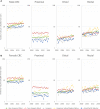Racial Disparities and Sex Differences in Early- and Late-Onset Colorectal Cancer Incidence, 2001-2018
- PMID: 34568072
- PMCID: PMC8459723
- DOI: 10.3389/fonc.2021.734998
Racial Disparities and Sex Differences in Early- and Late-Onset Colorectal Cancer Incidence, 2001-2018
Abstract
Background: Colorectal cancer (CRC) incidence rates have increased in younger individuals worldwide. We examined the most recent early- and late-onset CRC rates for the US.
Methods: Age-standardized incidence rates (ASIR, per 100,000) of CRC were calculated using the US Cancer Statistics Database's high-quality population-based cancer registry data from the entire US population. Results were cross-classified by age (20-49 [early-onset] and 50-74 years [late-onset]), race/ethnicity (non-Hispanic White, non-Hispanic Black, Hispanic, American Indian/Alaskan Native, Asian/Pacific Islander), sex, anatomic location (proximal, distal, rectal), and histology (adenocarcinoma, neuroendocrine).
Results: During 2001 through 2018, early-onset CRC rates significantly increased among American Indians/Alaskan Natives, Hispanics, and Whites. Compared to Whites, early-onset CRC rates are now 21% higher in American Indians/Alaskan Natives and 6% higher in Blacks. Rates of early-onset colorectal neuroendocrine tumors have increased in Whites, Blacks, and Hispanics; early-onset colorectal neuroendocrine tumor rates are 2-times higher in Blacks compared to Whites. Late-onset colorectal adenocarcinoma rates are decreasing, while late-onset colorectal neuroendocrine tumor rates are increasing, in all racial/ethnic groups. Late-onset CRC rates remain 29% higher in Blacks and 15% higher in American Indians/Alaskan Natives compared to Whites. Overall, CRC incidence was higher in men than women, but incidence of early-onset distal colon cancer was higher in women.
Conclusions: The early-onset CRC disparity between Blacks and Whites has decreased, due to increasing rates in Whites-rates in Blacks have remained stable. However, rates of colorectal neuroendocrine tumors are increasing in Blacks. Blacks and American Indians/Alaskan Natives have the highest rates of both early- and late-onset CRC.
Impact: Ongoing prevention efforts must ensure access to and uptake of CRC screening for Blacks and American Indians/Alaskan Natives.
Keywords: Epidemiology; National Program of Cancer Registries (NPCR); Surveillance; and End Results (SEER) program; early-onset colorectal cancer; joinpoint analysis; neuroendocrine tumors; racial disparities in cancer.
Copyright © 2021 Petrick, Barber, Warren Andersen, Florio, Palmer and Rosenberg.
Conflict of interest statement
The authors declare that the research was conducted in the absence of any commercial or financial relationships that could be construed as a potential conflict of interest.
Figures
References
-
- American Cancer Society . Colorectal Cancer Facts & Figures 2020-2022. Atlanta: American Cancer Society; (2020). Available at: https://www.cancer.org/content/dam/cancer-org/research/cancer-facts-and-....
-
- Meester RGS, Peterse EFP, Knudsen AB, de Weerdt AC, Chen JC, Lietz AP, et al. . Optimizing Colorectal Cancer Screening by Race and Sex: Microsimulation Analysis II to Inform the American Cancer Society Colorectal Cancer Screening Guideline. Cancer (2018) 124(14):2974–85. 10.1002/cncr.31542 - DOI - PMC - PubMed
LinkOut - more resources
Full Text Sources



